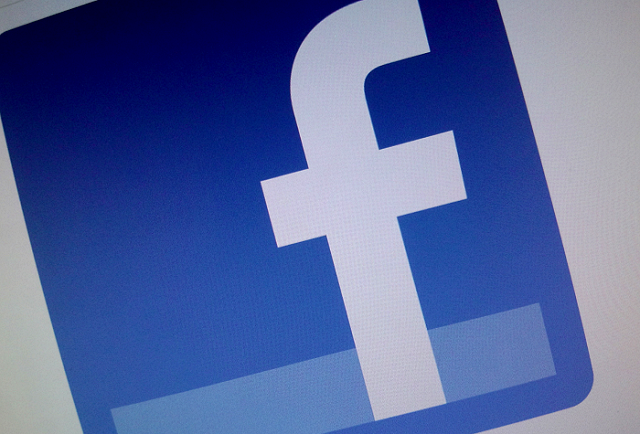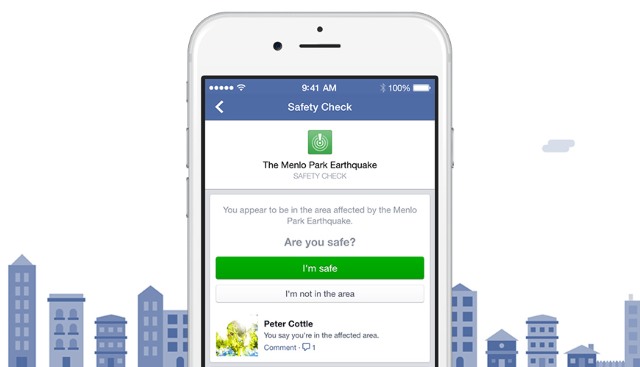
Facebook is taking over from Google as gatekeeper of the internet
Google is widely regarded as being one of the controllers of the internet. It is by far the most popular search engine and if a site does not appear in the first few pages of results, it may as well not exist. But Google is far from being the only gatekeeper to the internet; Facebook is increasingly vying for that crown, whilst making efforts to make access more secure through Tor. But what does this mean?
Facebook accounts for a terrifying percentage of web traffic -- it is the second most visited website in the world according to Alexa. This means that it has a huge influence online, giving the social network the opportunity to shape the web and holds great sway in determining which sites, services, and stories rise to popularity. To many people, this influence is all but invisible, and this is perhaps the most concerning part of the story. So how does Facebook's influence present itself?

Facebook explains why it split Messenger from main mobile app
Facebook CEO Mark Zuckerberg has finally explained the reason behind the company's decision to split Facebook and Facebook Messenger into two different mobile apps.
He said that the Facebook app was weighing down on messaging, making communication more difficult and slower.

Federal government websites violated the privacy of people looking for AIDS information
Government websites set to help people gain access to information about AIDS have been leaking the data about its users. Anyone visiting AIDS.gov and making use of the search box will probably be concerned to learn that, until the end of last month, data was transmitted in unencrypted form. The Washington Post points out that this data could be very easily intercepted and used to identify an individual.
We know that web users are more concerned about privacy than ever before -- and little wonder when authorities say that privacy is not a right. We know that there are various ways in which web activity can be monitored, but it seems that the smartphone app associated with AIDS.gov included this feature as standard -- the app collected and transmitted the latitude and longitude of users, again unencrypted.
![WhatsApp adds read receipts as messaging app celebrates fifth birthday [infographic]](https://betanews.com/wp-content/uploads/2014/11/whatsapp_birthday.jpg)
WhatsApp adds read receipts as it celebrates fifth birthday [infographic]
A new update has been rolled out to WhatsApp that lets users see when the person they are talking to reads a message. The check marks that appear next to messages to indicate that a message has been successfully sent and successfully delivered now have a third indicator mode. A double blue check mark means that the message has been read.
WhatsApp took the messaging world by storm when it first appeared on the scene. Despite having been found to be one of the most insecure messaging tools out there, it remains incredibly popular with around 600 million monthly users. WhatsApp's impact was such that Facebook parted with $19 billion to buy it, and this month the service celebrates its fifth birthday.

Electronic Frontier Foundation finds Skype, WhatsApp and more are disappointingly insecure
Secure communication is something we all crave online, particularly after Edward Snowden's NSA revelations increased public interest in privacy and security. With dozens of messaging tools to choose from, many claiming to be ultra-secure, it can be difficult to know which one to choose and which one to trust. Electronic Frontier Foundation (EFF) has published its Secure Messaging Scorecard which rates a number of apps and services according to the level of security they offer.
It's a fairly exhaustive list that includes numerous well-known names, as well as several more niche products. What is concerning, however, is that many of the most popular tools -- WhatsApp, Yahoo Messenger, Skype, SnapChat, and Facebook chat -- received very low ratings for failing to protect users and their communication data.

GCHQ's uncomfortable truth about the web: 'privacy has never been an absolute right'
The head of GCHQ, the UK's equivalent of the NSA, says that the Edward Snowden leaks have helped terrorist organizations such as ISIS who have taken to the web to spread propaganda. Writing in the Financial Times, Robert Hannigan points out that ISIS is the first terrorist group whose members have grown up on the internet. He says that the group has made use of "messaging and social media services such as Twitter, Facebook and WhatsApp, and a language their peers understand" and that the security tools that have popped up post-Snowden makes the work of GCHQ in tracking communication much harder.
This might not come as a surprise, but something else that Hannigan says is likely to raise eyebrows. His assertion that "privacy has never been an absolute right" goes against the grain of what many web users believe, but he suggests that the challenges facing governments and intelligence agencies in fighting back against terrorists can "only be met with greater co-operation from technology companies".

Facebook opens up to Tor users with new secure .onion address
For those who are concerned about their privacy post-Snowden, there are various ways to boost online privacy such as using the anonymizing Tor browser. Browsing the internet anonymously is something that scares the authorities -- there were reports just a couple of months ago that Comcast was threatening to cut off customers who chose to use Tor -- but now Facebook has opened up to the idea.
The social network -- often criticized for its own privacy policies -- has lifted its bans on using Tor, and has created a secure URL (https://facebookcorewwwi.onion/). This can be used to visit Facebook using any Tor-enabled browser and adds a few extra layers of protection for those looking to stay secure. While the idea of anonymity on Facebook may seem oxymoronic, there is a degree of logic.

Facebook teams up with Yahoo to create safe email standard
A new email standard called RRVS (Require-Recipient-Valid-Since) has been unveiled by Facebook. The new standard comes through the social network working in conjunction with Yahoo, and is designed to protect users against potential account hijacking.
It's now over a year since Yahoo decided that the time had come to start recycling email addresses that had lain dormant and unused. Concerns were voiced that little used email addresses could end up falling into the wrong hands and be used for nefarious purposes. With email addresses used for much more than just email communication -- often doubling up as login credentials -- the need for security in this area is apparent.

Microsoft co-founder Paul Allen pledges $100 million to tackle Ebola
Saying "the Ebola virus is unlike any health crisis we have ever experienced and needs a response unlike anything we have ever seen," Paul Allen, co-founder of Microsoft, pledged millions of dollars to help tackle the virus. The billionaire philanthropist increased his commitment to "at least $100 million" and called on others to contribute as well.
Ebola has now claimed the lives of more than 5,000 people, and Allen is keen to help fund not only heathcare professionals and treatments, but also the evacuation of international aid workers. Allen's #TackleEbola website is being used as a hub to raise money for a number of individual projects and causes such as household protection kits and hand-washing stations.

Ello pockets $5.5 million, legally pledges to never feature ads
Out of nowhere, Ello exploded, ninja-style, into the public eye. The social network shot to fame after Facebook's real name policy sent many users scuttling off in search of a new home, and the spartan, "beautiful" (Ello's word, not mine) social network welcomed an influx of new users. In addition to the "use whatever name you want" philosophy, users were happy to find that Ello offered a completely ad-free experience.
Now the lack of ads has been enshrined in law. While pocketing $5.5 million in a new round of venture funding, Ello has converted to a State of Delaware Public Benefit Corporation (PBC). The social network vows to never show nor sell ads, and requires this commitment to transfer to any future owner, should the company be acquired.

The faces behind the biggest apps in the world [infographic]
Whatever your mobile platform of choice, there are some apps which are all but impossible to avoid. Some -- like Facebook, Twitter, and YouTube -- have reasonably dull histories; we all know the corporations behind their creation. But there are plenty of other big names with less well known histories. A new infographic from IrishApps.org reveals the stories behind some famous titles, and reveal the fortunes they have generated.
For example, did you know that Flappy Bird was originally going to be called Flap Flap, and was put together in just two days? Or that the founder of Summly was just 17 years old when he sold his app to Yahoo? How about the fact that the Ukrainian developer of WhatsApp is estimated to be worth $7 billion?

When disaster strikes, Safety Check lets people know you're OK... via Facebook
In times of natural disaster and chaos, people are increasingly turning to social media for news and updates. But while Facebook is a handy way to keep up to date with the latest news about Ebola, earthquakes, and other problems, it's also a valuable means of checking up on loved ones to make sure they're OK. Now the social network has a new tool that makes it easier than ever to let your friends and family know that you’re safe if you happen to be in or near a problem area.
It’s a simple idea. Facebook uses your statuses and check in details to determine where you are. If you happen to be in a disaster area, a message will pop up in your account or mobile app asking if you're OK. You can then indicate that all is well and your friends and family will be able to see that there is no cause for concern.

'Keep up the hard work and we'll freeze your eggs', say Apple and Facebook
From serving up free meals to providing on-site massages, companies are always looking for innovative ways to recruit and keep talented staff. But is paying for women to freeze their eggs a step too far?
Facebook and Apple, it was revealed this week, will help their female employees in the US pay for the cost of freezing and storing their eggs.

The battle to wipe out revenge porn continues
In the wake of the Fappening, online porn and nudity has been thrust into the public consciousness once again. But porn is about much more than titillating celebrity photos -- even if research shows that we're finding it easier to waste our time online when we should be getting on with work. Revenge porn is on the rise, and steps are being taken to try to thwart its progress. As the Fappening showed us, taking saucy pictures of oneself or partner is far from uncommon. This is fun and exciting in the middle of a relationship, but if that relationship should break down, there's no knowing what could happen to those pictures and videos.
Disgruntled partners may decide to get revenge on their former lovers by sharing those intimate photos and movies online, or it may be obtained by a third party and used as a tool for bribery. Many US states have outlawed the practice, and now the UK is following suit.

Apple remains the most valuable brand in the world
Continuing its run at the top of the charts, Apple is revealed as the most valuable brand in the world. With a massive 21 percent increase over the last 12 months, Apple is now valued at just under $119 billion -- almost double that of Microsoft which finds itself in fifth place with a value of just over $61 billion.
The top 100 rankings have been published by Interbrand, and a number of familiar names from the world of tech are to be found in the top 20. Google's value jumped by 15 percent from last year to $107 billion, and the search giant remains in second position.
